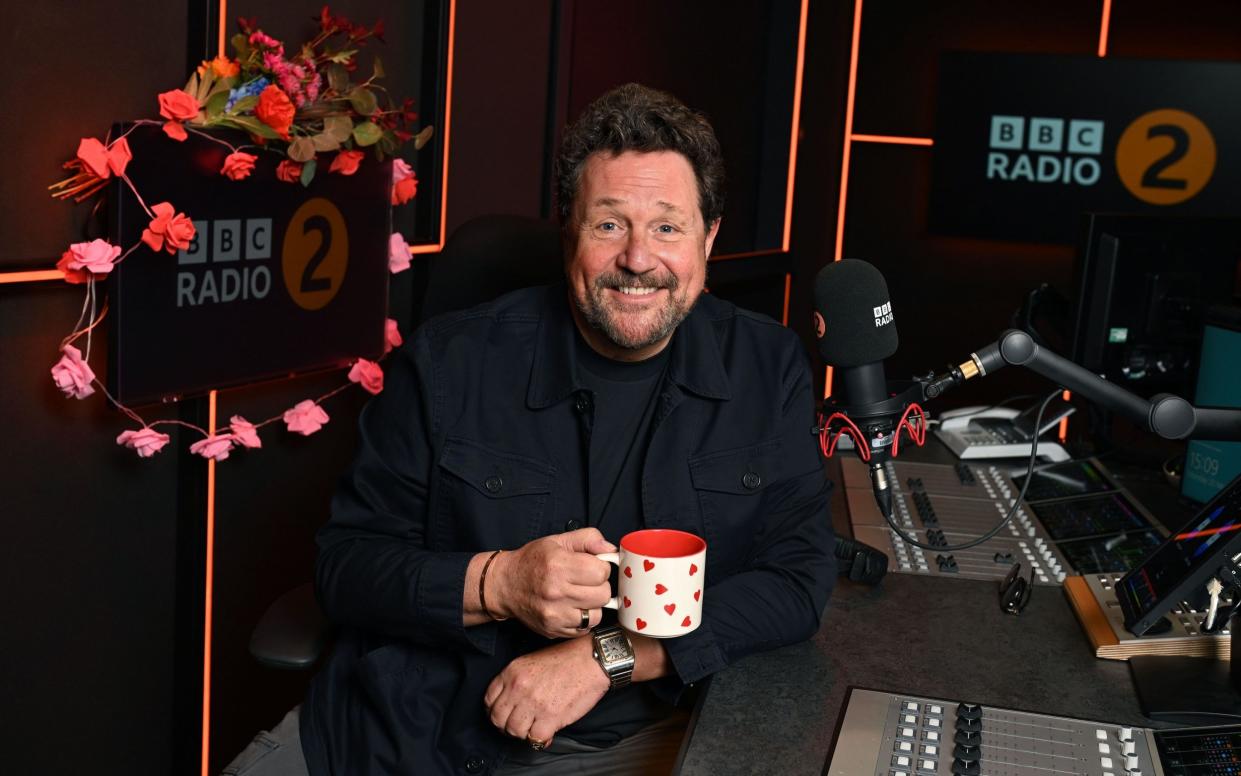Radio 2’s Sunday Love Songs has a new host and Michael Ball may just woo us all

Like its owner, my washing machine has a breakdown roughly once every 10 months. This has led me to devise the Laundrette Test for Radio 2 presenters. Radio 2 isn’t like other stations. It’s the most popular in the country, and inescapable. It’s not enough for its DJs to please people who listen voluntarily. Their show must also be bearable to those who passively endure it – in cafes, waiting rooms, laundrettes. So, here’s what makes a good Radio 2 DJ: if you can listen for a full two hours, with no other distraction than your socks going round the tumbler, and not want to throttle them, they’ve passed the Laundrette Test.
On Sunday morning, Michael Ball had the daunting task of taking over Sunday Love Songs from the show’s creator, the late and much-missed Steve Wright, to whom he sweetly dedicated a closing song (Wichita Lineman, one of Wright’s favourites). Ball passes the Laundrette Test, barely. When he’s not giggling – he giggles too much – he is a smooth, capable, don’t-startle-the-horses broadcaster.
This show, he said, is “all about family. Friendship. Romance. Memories”. There was much talk of hugging. He began with Wet Wet Wet – well, start as you mean to continue. Love comes in many forms, and he welcomed phone-ins about any kind of love, even non-human variants. (“Colin, my parrot, sat on my shoulder and said, ‘I love you…’”) And then there were his own sweet-nothings to the listener. “I’m going to be waking up with you, making the breakfast with you…”

The idea of waking up beside Ball will doubtless leave many listeners misty-eyed. I’m not one, but this show isn’t for me. It’s for Jane, who was celebrating her 70th birthday, and whose husband phoned in to say: “Jane’s been a fan of you since seeing you in your tighty-whiteys in Aspects of Love.” Gosh. The music was blandly inoffensive – apart from one hilariously misjudged bit of modern pop. For two honeymooners, he lined up Taylor Swift’s lyrically grim recent single, Fortnight – because “that’s probably how long the honeymoon’s going to be.” Yes, a song that goes “My husband is cheating, I wanna kill him!” Perfect for newlyweds.
If Wright’s are big shoes to fill, Ball’s move meant his own more modestly sized old loafers were left vacant in the lunchtime studio for the Sunday 11am-1pm slot. Enter Paddy McGuinness, clearly thrilled to get his own show after stints sitting in for others. He was funny, enthusiastic and just scattershot-enough to sound authentic. A quiz segment drolly mixed topical news with whimsy (“What colour socks am I wearing?”). The music helped, too.
Of course, everyone’s taste in music is subjective – except mine, which is correct. Guinness’s choices – Aretha Franklin, Dusty Springfield, Blondie – categorically beat Love Songs’ bland line-up of McFly, Will Young and Shania Twain. I might listen again.

Tuesday brought big news for potential Reform voters: the party is shaping its immigration policy purely to please the BBC – more specifically, one BBC presenter. At least, that’s what Nigel Farage told Mishal Husain on Today (Radio 4).
Reducing the number of people coming into this country is at the core of Reform’s campaign. So, Husain, quite reasonably asked, how many people would he like to see coming in? He tried miserably to change the subject, but Husain was unshakeable. Would Reform accept 600,000 as a target? “If it makes you happy, that’s what we’ll do,” he said. It was a petulant answer, but with a sweaty undertone of desperation.
I expected Farage to have ideas about dealing with immigration. He had none, U-turning on key manifesto pledges from one sentence to the next. When a man stands for election, voters have a right to take him at his word. Farage’s final word on his party’s central policy was – apparently – that immigration targets will be set at whatever number means Husain will let him leave the studio alive.
Aside from one question about his children, which was a bit of a cheap dig, this was a masterclass in political interviewing. Husain put policy first, drilling into detail: how will Reform’s manifesto pledges be put into practice? To whom will they apply? Do the numbers add up? Too often, politicians get away with empty bloviating. But anyone standing for election ought to be able to give serious answers when asked what their party wants to achieve, and how they plan to achieve it. If the leader of every party gets this kind of incisive questioning over the next few weeks – and they should – then Today, and our democracy, will be the better for it.
